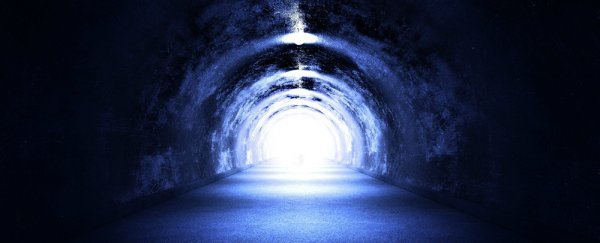Depending on your beliefs, the experience of death hovers over our lives like an unknowable but inevitable void. Aside from the well-cited 'bright-light at the end of the tunnel' cliché, we have no idea what it's going to look or feel like, but we know for sure that we're all eventually going to find out.
One person who has a better idea than most is Sam Parnia, the director of resuscitation research at Stony Brook University School of Medicine in the US, who has conducted the largest study to date on resuscitated patients in an attempt to try to unravel the mental and cognitive experience of dying. As part of his research, he's interviewed more than 100 people who've been brought back to life after suffering from a fatal cardiac arrest, and found that nearly half of them have some memory, ranging from terrifying to blissful, of their death.
Publishing in the journal Resuscitation, Parnia has grouped those memories into seven broad categories, proving that dying is a far more diverse experience than we've previously imagined. These categories are:
- Fear
- Seeing animals or plants
- Bright light
- Violence and persecution
- Deja-vu
- Seeing family
- Recalling events post-cardiac arrest
That last one is pretty fascinating, with two of the patients interviewed able to recall the events that happened after they had technically died and, according to our understanding of the human brain, should have ceased to be aware.
"We know the brain can't function when the heart has stopped beating, but in this case conscious awareness appears to have continued for up to three minutes into the period when the heart wasn't beating, even though the brain typically shuts down within 20 to 30 seconds after the heart has stopped," Parnia told The National Post last year.
However, these recall experiences only occurred in 2 percent of patients, and the majority of people remembered seeing and feeling things that weren't real at the time of their death.
"I was terrified. I was told I was going to die and the quickest way was to say the last short word I could remember," said one patient. Another explained that it felt like "being dragged through deep water with a big ring and I hate swimming - it was horrid".
But it's not all bad news: 22 percent of patients had a pleasant experience, seeing plants and animals, their family, or simply feeling a warm light before the end.
Last week, a reddit thread also probed the experience of death, asking those who have technically died to report back on what it really felt like. Obviously the responses are unverified, but they back up Parnia's conclusion that the experience is incredibly diverse.
Adam Withnall over at The Independent has written a fantastic review of the responses, but overall, he finds that they can be broadly grouped into three categories. "There are those who felt nothing at all; those who had an experience of light and some interaction with another person/being; and those who felt they could watch what was happening while they were 'dead' without being able to do anything," he writes.
Here is just a small sample of the more than 700 comments on the thread:
"I was getting an angiogram done, wide awake watching the screen and talking to the doctor. Alarms started to go off and everyone became panicked. My world became soft and foggy and everything faded to black. Next thing I remember was opening my eyes and hearing a Dr ay "we got him back". It was really a peaceful feeling more than anything."
"I collapsed at a work meeting in February 2014 and had no pulse or cardiac rhythm for about five minutes. My last memory was from about an hour prior to the incident, and my next memory was from two days later, when I emerged from a medically-induced coma."
"Pure, perfect, uninterrupted sleep, no dreams."
"I do remember a little bit of the ambulance ride, but not from my own body. It was seriously the strangest thing I have ever experienced. It could have been a dream, but I saw my own unconscious body, completely flatlined, in the ambulance. I remember the EMT who was in the ambulance with me (whom I did not see before I passed out) had mint green hair and I couldn't remember his name, but I asked for him when I regained consciousness about three days later."
"I was standing in front of a giant wall of light. It stretched up, down, left and right as far as I could see. Kind of like putting your eyes 6″ from a fluorescent lightbulb. The next memory I have is waking up in the hospital."
"I saw nothingness. Black, long empty, but I had a feeling like everything was great and nothing was wrong at all. Imagine how preexistence felt, much the same as post existence."
Parnia hopes his research opens the door for further research into near-death experiences, and will also encourage people think about the end of our lives in a more scientific way, and taking death out of the realm of religion or superstition.
"Anyone with a relatively objective mind will agree that this is something that should be investigated further," Parnia told BBC Future. "We have the means and the technology. Now it's time to do it."
Sources: BBC Future, reddit, The Independent
